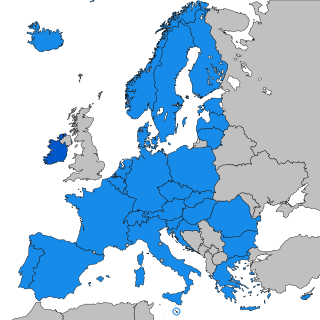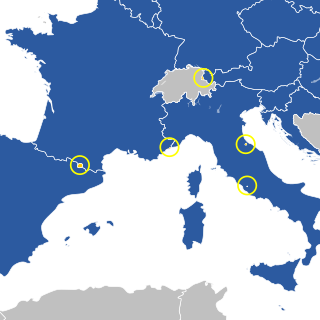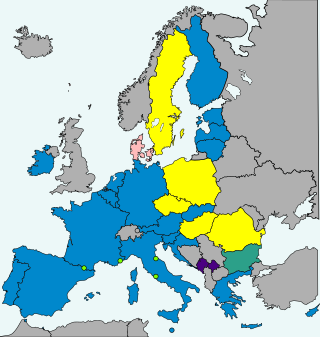Contents
- Incumbents
- Events
- January
- July
- Predicted and scheduled events
- See also
- Overviews
- Related timelines for current period
- References
| |||||
| Decades: | |||||
|---|---|---|---|---|---|
| See also: | |||||
Events from 2023 in the European Union.
| |||||
| Decades: | |||||
|---|---|---|---|---|---|
| See also: | |||||
Events from 2023 in the European Union.

The European Union (EU) is a supranational political and economic union of 27 member states that are located primarily in Europe. The union has a total area of 4,233,255 km2 (1,634,469 sq mi) and an estimated total population of over 448 million. The EU has often been described as a sui generis political entity combining the characteristics of both a federation and a confederation.

Euroscepticism, also spelled as Euroskepticism or EU-scepticism, is a political position involving criticism of the European Union (EU) and European integration. It ranges from those who oppose some EU institutions and policies, and seek reform, to those who oppose EU membership and see the EU as unreformable. The opposite of Euroscepticism is known as pro-Europeanism, or European Unionism.

The Schengen Information System (SIS) is a governmental database maintained by the European Commission. The SIS is used by 32 European countries to find information about individuals and entities for the purposes of national security, border control and law enforcement since 2001. A second technical version of this system, SIS II, went live on 9 April 2013. An upgraded Schengen Information System entered into operation on 7 March 2023.

The euro area, commonly called the eurozone (EZ), is a currency union of 20 member states of the European Union (EU) that have adopted the euro (€) as their primary currency and sole legal tender, and have thus fully implemented EMU policies.

The European Union (EU) has expanded a number of times throughout its history by way of the accession of new member states to the Union. To join the EU, a state needs to fulfil economic and political conditions called the Copenhagen criteria, which require a stable democratic government that respects the rule of law, and its corresponding freedoms and institutions. According to the Maastricht Treaty, each current member state and the European Parliament must agree to any enlargement. The process of enlargement is sometimes referred to as European integration. This term is also used to refer to the intensification of co-operation between EU member states as national governments allow for the gradual harmonisation of national laws.
European integration is the process of industrial, economic, political, legal, social, and cultural integration of states wholly or partially in Europe or nearby. European integration has primarily come about through the European Union and its policies.

The most recent enlargement of the European Union saw Croatia become the European Union's 28th member state on 1 July 2013. The country applied for EU membership in 2003, and the European Commission recommended making it an official candidate in early 2004. Candidate country status was granted to Croatia by the European Council in mid-2004. The entry negotiations, while originally set for March 2005, began in October that year together with the screening process.

Switzerland is not a member state of the European Union (EU). It is associated with the Union through a series of bilateral treaties in which Switzerland has adopted various provisions of European Union law in order to participate in the Union's single market, without joining as a member state. All but one of Switzerland's neighbouring countries are EU member states.

The visa policy of the Schengen Area is a component within the wider area of freedom, security and justice policy of the European Union. It applies to the Schengen Area and to other EU member states except Ireland. The visa policy allows nationals of certain countries to enter the Schengen Area via air, land or sea without a visa for stays of up to 90 days within a 180-day period. Nationals of certain other countries are required to have a visa either upon arrival or in transit.

Currently, all of the European microstates have some form of relations with the European Union (EU).

The European Union (EU) is a political and economic union of 27 member states that are party to the EU's founding treaties, and thereby subject to the privileges and obligations of membership. They have agreed by the treaties to share their own sovereignty through the institutions of the European Union in certain aspects of government. State governments must agree unanimously in the Council for the union to adopt some policies; for others, collective decisions are made by qualified majority voting. These obligations and sharing of sovereignty within the EU make it unique among international organisations, as it has established its own legal order which by the provisions of the founding treaties is both legally binding and supreme on all the member states. A founding principle of the union is subsidiarity, meaning that decisions are taken collectively if and only if they cannot realistically be taken individually.

In general, the law of the European Union is valid in all of the twenty-seven European Union member states. However, occasionally member states negotiate certain opt-outs from legislation or treaties of the European Union, meaning they do not have to participate in certain policy areas. Currently, three states have such opt-outs: Denmark, Ireland and Poland. The United Kingdom had four opt-outs before leaving the Union.
Events in the year 2010 in the European Union.

The Schengen Area is an area comprising 27 European countries that have officially abolished many passport and many other types of border control at their mutual borders. Being an element within the wider area of freedom, security and justice policy of the European Union (EU), it mostly functions as a single jurisdiction under a common visa policy for international travel purposes. The area is named after the 1985 Schengen Agreement and the 1990 Schengen Convention, both signed in Schengen, Luxembourg.

The accession of Kosovo to the European Union (EU) is on the current agenda for future enlargement of the EU. Kosovo is currently recognized by the EU as a potential candidate for accession.

The history of the European Union between 1993 and 2004 was the period between its creation and the 2004 enlargement. The European Union was created at the dawn of the post–Cold War era and saw a series of successive treaties laying the ground for the euro, foreign policy and future enlargement. Three new member states joined the previous twelve in this period and the European Economic Area extended the reach of the EU's markets to three more.

In the European Union (EU), enhanced cooperation is a procedure where a minimum of nine EU member states are allowed to establish advanced integration or cooperation in an area within EU structures but without the other members being involved. As of October 2017, this procedure is being used in the fields of the Schengen acquis, divorce law, patents, property regimes of international couples, and European Public Prosecutor and is approved for the field of a financial transaction tax.

Croatia adopted the euro as its currency on 1 January 2023, becoming the 20th member state of the eurozone. A fixed conversion rate was set at 1 € = 7.5345 kn.

The United Kingdom was a member state of the European Union and of its predecessor the European Communities from 1973 until 2020. Since the foundation of the European Communities, it has been an important neighbour, and was a leading member state until its withdrawal from the EU on 31 January 2020 as a result of Brexit, ending 47 years of membership.
This is a list of events that will take place in Europe in 2023.